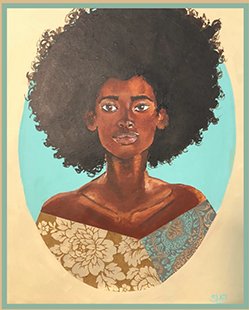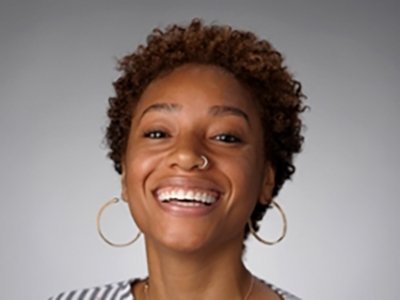New CFAC Exhibit to Honor Black History, Women's History Months
Solo show by M.A. student Spencer Stultz '17 explores notions of identity, spirituality, experience Feb. 22-March 23

Spencer Stultz ’17, a master’s candidate in Pan African studies, will celebrate the opening of her first one-woman exhibit at the Community Folk Art Center (CFAC) on Friday, Feb. 22, from 5-7 p.m.
Titled “A Time for Joy and a Time for Sorrow,” the show uses portraiture to explore notions of identity, spirituality and experience. The exhibit runs until Saturday, March 23, in honor of both Black History Month and Women’s History Month.
The Department of African American Studies (AAS) in the College of Arts and Sciences (A&S) is co-sponsoring Friday’s reception and the exhibit, which are free and open to the public.
CFAC is at 805 E. Genesee St., Syracuse. For more information, call 315.442.2230 or visit communityfolkartcenter.org.
“Spencer is a gifted painter, utilizing portraiture to interrogate the complexities of life,” says CFAC Executive Director Tanisha M. Jackson. “Art is a lens through which she conceptualizes topics that are integral to the human experience.”

In AAS, Stultz resides at the nexus of contemporary art and community development. She is an academic consultant for fullCIRCLE, an all-University program in the Office of Multicultural Affairs (OMA) that helps undergraduates adjust to college life.
After transferring to Syracuse from Howard University, Stultz earned a bachelor’s degree in political science from A&S and the Maxwell School, with a minor in AAS and painting in the College of Visual and Performing Arts.
As an undergraduate, she won the Winston Fisher Seminar’s business plan competition, served as a peer mentor in OMA and tutored student-athletes in the Stevenson Educational Center.
“I am interested in how contemporary black visual art affects community and social activism,” says the Columbus, Ohio, native. “Just as my own identity and experiences drive the work I create, I hope to expand the conversations we have around issues of bias, race and identity.”
Founded in 1972 as a launching pad for African diaspora artists, CFAC has grown to support Latino, Native American and women artists. The center is a longtime partner of AAS, offering public exhibitions, artist talks, classes and workshops, particularly in art, dance and movement.
